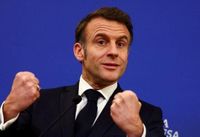In a recent statement, French Prime Minister François Bayrou condemned U.S. President Donald Trump's support for Marine Le Pen, the far-right candidate in France, describing it as "interference" in France's domestic affairs. Bayrou's comments came during an interview with the newspaper Le Parisien, where he also addressed the broader implications of international political dynamics.
Bayrou's remarks were made in response to a question about the backing Le Pen has received not only from Trump but also from the Kremlin and Hungarian Prime Minister Viktor Orban. The Prime Minister emphasized the importance of not conflating these three political stances, criticizing what he perceives as a dangerous trend of international political strategies that disregard national boundaries.
Le Pen is currently under investigation by the French judiciary for alleged misuse of public funds, which has led to her being barred from running for election for five years. This ruling has sparked widespread protests from her supporters, both in France and internationally, as many view it as an attack on her political legitimacy.
Trump, in a post on his social media platform Truth Social, expressed his belief that Le Pen is facing persecution from "European leftists who weaponize the law to silence free speech and suppress political competition." This sentiment was echoed by Kremlin spokesman Dmitry Peskov, who remarked that the political developments across European capitals demonstrate a troubling trend of undermining democratic processes.
Hungarian Prime Minister Viktor Orban, a prominent ally of Le Pen, characterized her as a victim of conspiracy, aligning her with other nationalist leaders like Trump and Italian Deputy Prime Minister Matteo Salvini. Orban's comments reflect a growing camaraderie among far-right politicians who feel threatened by mainstream political opposition.
In addition to political tensions, Bayrou also addressed economic concerns stemming from new tariffs imposed by the Trump administration. He estimated that these tariffs could cost France more than 0.5% of its gross domestic product, posing significant risks to the French economy. "The threat of job losses is extremely high, particularly in sectors such as agriculture and beverages, where tens of thousands of jobs are at stake," Bayrou warned.
On the other side of the English Channel, French President Emmanuel Macron has been proactive in addressing the potential fallout from these tariffs. Following discussions with British Prime Minister Keir Starmer, Macron stated that both nations are committed to closely coordinating their positions in negotiations with Trump regarding trade issues.
Macron emphasized the importance of unity, asserting, "The trade war is not in anyone's interest. We must be united and determined to protect our citizens and our companies." His comments highlight the collaborative approach France and the UK are adopting in the face of potential economic challenges posed by U.S. trade policies.
The backdrop of these discussions is a growing concern among European leaders about the implications of Trump's presidency on international relations and economic stability. As tensions rise, the need for a cohesive response to protect national interests becomes increasingly pressing.
In summary, the intersection of politics and economics is becoming more pronounced as figures like Trump and Le Pen influence public discourse in ways that may have lasting impacts on both domestic and international fronts. With the French judiciary's ruling against Le Pen and the looming threat of tariffs, the stakes are high for all involved parties.
As the political landscape evolves, the responses from European leaders will be crucial in shaping the future of their nations and their relationship with the United States. The unity expressed by Macron and Starmer may serve as a model for other countries grappling with similar challenges.




